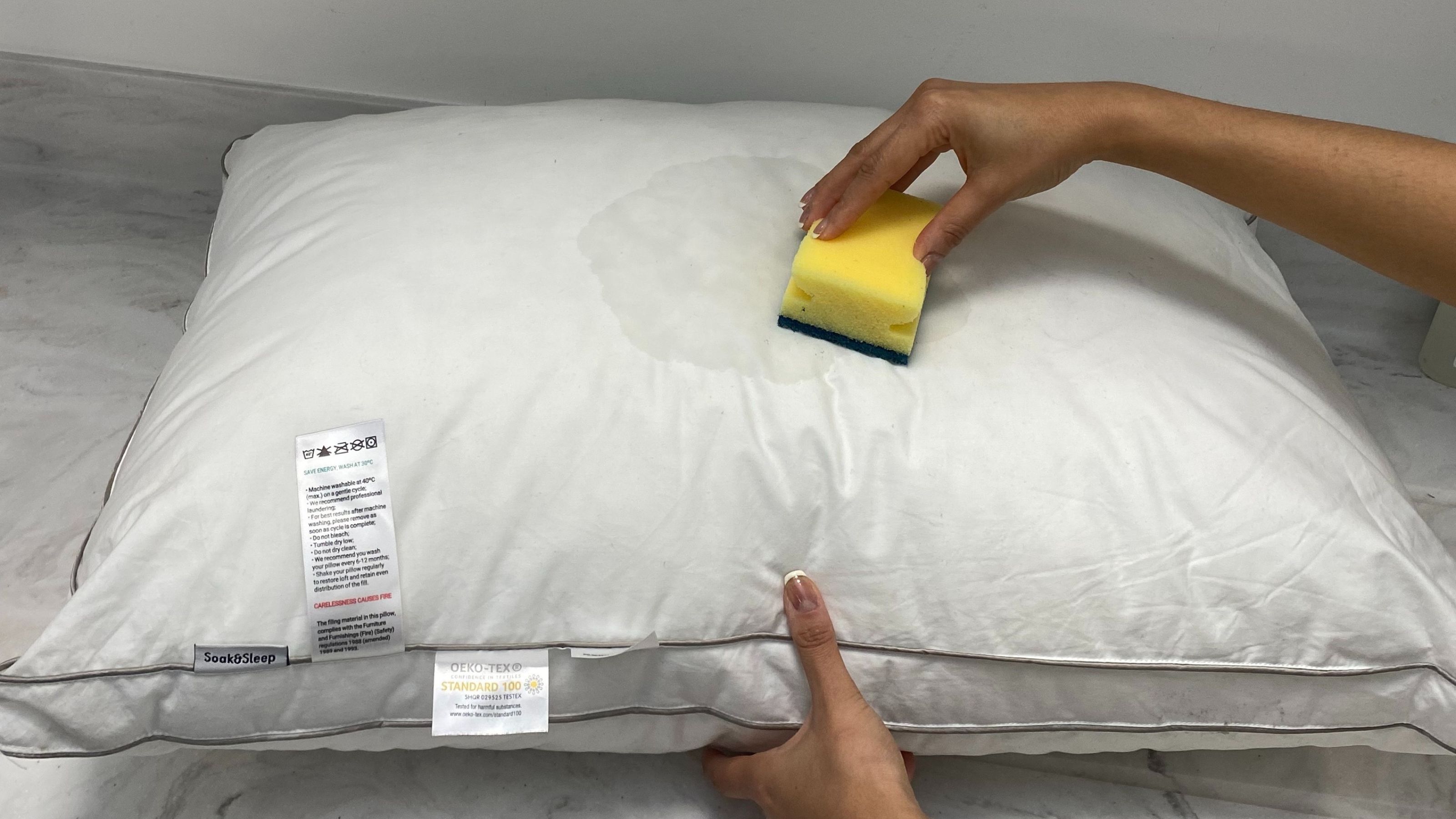Dry cleaning pillows is not recommended. Most pillows can be safely machine washed or hand washed instead.
Pillows collect dust, allergens, and odors over time, affecting sleep quality. Regular cleaning is essential for maintaining a healthy sleeping environment. While some pillows may require special care, many can be cleaned at home. Understanding the material of your pillow will help determine the best cleaning method.
Washing and drying pillows properly can rejuvenate them and extend their lifespan. Consider using a pillow protector to keep them cleaner for longer. This guide will help you navigate the best practices for cleaning various types of pillows, ensuring you enjoy a fresh and comfortable sleep experience. Stay informed and take the necessary steps to care for your pillows effectively.
The Importance Of Pillow Hygiene
Pillow hygiene is crucial for a healthy sleep environment. Dirty pillows can harbor dust mites, bacteria, and allergens. These can affect your overall health. Regular cleaning helps maintain freshness and comfort.
Link Between Clean Pillows And Health
Clean pillows contribute to better health in several ways:
- Reduces Allergens: Clean pillows lower allergy triggers.
- Prevents Infections: Regular washing eliminates harmful bacteria.
- Improves Sleep Quality: Fresh pillows ensure more restful sleep.
Studies show that clean bedding can enhance sleep. It also decreases the risk of respiratory issues.
Effects Of Neglected Pillow Care
Neglecting pillow care can lead to several problems:
- Increased Allergies: Dust mites thrive in unwashed pillows.
- Poor Sleep Quality: Unhygienic pillows can disrupt sleep.
- Skin Issues: Dirty pillows may cause acne or rashes.
Over time, these issues can lead to serious health concerns. Regular cleaning is essential for well-being.
| Issue | Effect | Solution |
|---|---|---|
| Dust Mites | Allergies | Dry clean pillows regularly |
| Bacteria | Infections | Use pillow protectors |
| Stains | Poor Sleep | Wash every 3-6 months |
Maintaining pillow hygiene is simple and essential. Regular attention keeps your sleep space clean and healthy.
Dry Cleaning Vs. Washing Pillows
Choosing between dry cleaning and washing pillows can be confusing. Each method has its benefits and drawbacks. Understanding these can help you keep your pillows clean and fresh.
Pros And Cons Of Dry Cleaning
| Pros | Cons |
|---|---|
|
|
When To Choose Washing Over Dry Cleaning
- Budget-Friendly: Washing costs less.
- Easy Maintenance: Home washing is convenient.
- Regular Cleaning: Frequent washing keeps pillows fresh.
- Safe for Fabrics: Most pillows can handle washing.
Consider washing if you want to save money. Home washing is often easier and safer for everyday use. Always check care labels for specific instructions.
Types Of Pillows And Their Care
Pillows come in various types. Each type needs special care. Understanding how to maintain them helps prolong their life. Here are some popular types of pillows and their care methods.
Caring For Down And Feather Pillows
Down and feather pillows provide luxury and comfort. They require careful cleaning to keep them fluffy. Here are some tips for their care:
- Dry Cleaning: Always prefer professional dry cleaning.
- Spot Cleaning: Use a mild detergent for stains.
- Fluff Regularly: Shake and fluff pillows daily.
- Avoid Moisture: Keep them dry to prevent mildew.
Check for any tears. Repair them quickly to keep filling inside. Store them in breathable bags. Avoid plastic covers as they trap moisture.
Handling Synthetic And Foam Pillows
Synthetic and foam pillows are popular for their support. They are easier to clean than down pillows. Follow these care tips:
| Type of Pillow | Cleaning Method | Drying Method |
|---|---|---|
| Synthetic | Machine wash on gentle cycle. | Air dry or tumble dry on low. |
| Foam | Spot clean only; do not machine wash. | Air dry completely; avoid heat. |
Check labels for specific care instructions. Foam pillows often lose shape if washed incorrectly. Avoid soaking them in water.
Keep pillows fresh by airing them out regularly. This helps reduce odors. A well-cared pillow ensures better sleep.

Credit: nuyale.com
Preparing Pillows For Dry Cleaning
Dry cleaning pillows can refresh your bedding. Proper preparation is key. Follow these steps to ensure a successful cleaning process.
Checking Labels And Instructions
Start by checking the label on your pillow. It contains important information.
- Look for cleaning symbols.
- Note any specific instructions.
- Identify the material type.
Some pillows may require special care. For example, down pillows need different treatment than synthetic ones. Always follow the manufacturer’s guidelines.
Pre-cleaning Stain Treatment
Treat stains before dry cleaning. This helps in removing tough spots.
- Identify the type of stain.
- Use a suitable stain remover.
- Apply the remover gently.
- Let it sit for 5 to 10 minutes.
- Blot with a clean cloth.
Never rub the stain. Rubbing can spread it. Always test the stain remover on a small area first. This prevents damage to the fabric.
The Dry Cleaning Process Explained
Dry cleaning pillows is an effective way to keep them fresh and clean. The process uses special techniques and chemicals. Understanding this process helps you appreciate the care your pillows receive.
Chemicals And Techniques Used
Dry cleaning relies on specific chemicals instead of water. The most common solvent is perchloroethylene, known as “perc.” Other solvents include:
- Hydrocarbon – gentler on fabrics
- Green solvents – eco-friendly options
Techniques include:
- Pre-treatment – stains are treated before cleaning.
- Machine Cleaning – pillows are cleaned in a special machine.
- Drying – pillows are dried without water.
What Happens To Your Pillows During Dry Cleaning?
The dry cleaning process involves several steps:
| Step | Description |
|---|---|
| Inspection | Technicians check for stains and damage. |
| Pre-treatment | Stains are treated with special solutions. |
| Cleaning | Pillows are cleaned with solvents in a machine. |
| Drying | Pillows are dried without using water. |
| Finishing | Pillows are fluff and inspected again. |
This process removes dirt, allergens, and odors. Your pillows come back looking and feeling new.
Post-dry Cleaning Care
Taking care of your pillows after dry cleaning is essential. Proper maintenance keeps them fresh and extends their life. Follow these tips to ensure your pillows remain in top shape.
Proper Storage Solutions
Storing pillows correctly prevents damage and maintains their shape. Here are some effective storage solutions:
- Use breathable pillowcases: Protect pillows from dust.
- Avoid compression: Store pillows flat or upright.
- Keep them in a cool, dry place: Avoid humidity and heat.
- Consider vacuum-sealed bags: Great for long-term storage.
Maintaining Pillow Freshness Between Cleanings
Keeping pillows fresh helps them last longer. Here are some tips:
- Shake pillows regularly: This helps fluff them up.
- Spot clean stains: Use mild detergent for small spots.
- Air them out: Place pillows outside on sunny days.
- Use pillow protectors: They prevent dirt and sweat buildup.
These simple steps keep your pillows clean and comfortable.
Diy Pillow Refresh Techniques
Give your pillows a new lease on life with simple DIY techniques. These methods help remove dirt, odors, and allergens. You don’t need to spend a lot to keep your pillows fresh.
Home Dry Cleaning Kits
Home dry cleaning kits are a convenient option. They are easy to use and effective. Follow these steps:
- Read the instructions on the kit.
- Place pillows in the cleaning bag.
- Add the cleaning cloth from the kit.
- Seal the bag and toss it in the dryer.
- Let it run for the recommended time.
- Remove pillows and fluff them up.
Most kits work well on polyester and cotton pillows. Check the label for best results.
Natural Deodorizing Methods
Natural methods are safe and effective for deodorizing pillows. Here are some options:
- Baking Soda: Sprinkle on pillows. Let sit for 30 minutes. Vacuum off.
- Essential Oils: Mix a few drops with water. Spray lightly on pillows.
- Vinegar: Mix equal parts water and vinegar. Spray and let dry.
These methods help eliminate odors without harsh chemicals. They leave pillows smelling fresh.

Credit: www.realhomes.com
Choosing The Right Dry Cleaner
Selecting a dry cleaner for your pillows is crucial. Proper care ensures your pillows stay fresh and hygienic. Not all dry cleaners are the same. Look for one that specializes in pillows. Here are some tips to find the best option.
Criteria For Selecting A Dry Cleaner
- Experience: Choose a cleaner with years of experience.
- Specialization: Look for a service that specializes in pillows.
- Reviews: Check online reviews for customer satisfaction.
- Certifications: Ensure they have proper certifications.
- Eco-Friendly: Opt for cleaners using safe products.
Questions To Ask Before Service
Before committing to a dry cleaner, ask the following questions:
- What cleaning methods do you use?
- How do you handle delicate fabrics?
- Do you offer a satisfaction guarantee?
- What is the turnaround time for cleaning?
- Are there any hidden fees?
These questions help ensure you choose the right service for your pillows. Prioritize cleanliness and safety for your home.

Credit: www.reddit.com
Frequently Asked Questions
How Often Should I Dry Clean My Pillows?
You should dry clean your pillows at least once a year. However, if you suffer from allergies or have pets, consider more frequent cleaning. Regular maintenance helps remove dust mites, allergens, and odors. This ensures your pillows remain fresh, hygienic, and supportive for a good night’s sleep.
Can All Pillows Be Dry Cleaned?
Not all pillows are suitable for dry cleaning. Check the care label for specific instructions. Synthetic pillows typically withstand dry cleaning, while memory foam or latex pillows may get damaged. Always choose the cleaning method that best preserves the material and structure of your pillows for longevity.
What Is The Benefit Of Dry Cleaning Pillows?
Dry cleaning pillows effectively removes deep-set dirt and allergens. It helps eliminate odors that regular washing may not remove. This method uses solvents that can penetrate fibers without causing shrinkage. As a result, your pillows remain fluffy, clean, and comfortable, improving your sleep quality.
Is It Safe To Dry Clean Pillows At Home?
Dry cleaning pillows at home can be risky without proper knowledge. Home kits may not effectively remove all stains or allergens. Additionally, some materials may shrink or get damaged. It’s safer to consult a professional who understands the specific needs of your pillow’s fabric and filling.
Conclusion
Keeping your pillows clean enhances both comfort and hygiene. Dry cleaning is an effective method to remove dirt and allergens. Regular maintenance prolongs the life of your pillows. Always follow care labels for best results. Invest in professional cleaning for a fresh, restful sleep every night.
Your pillows deserve it!
